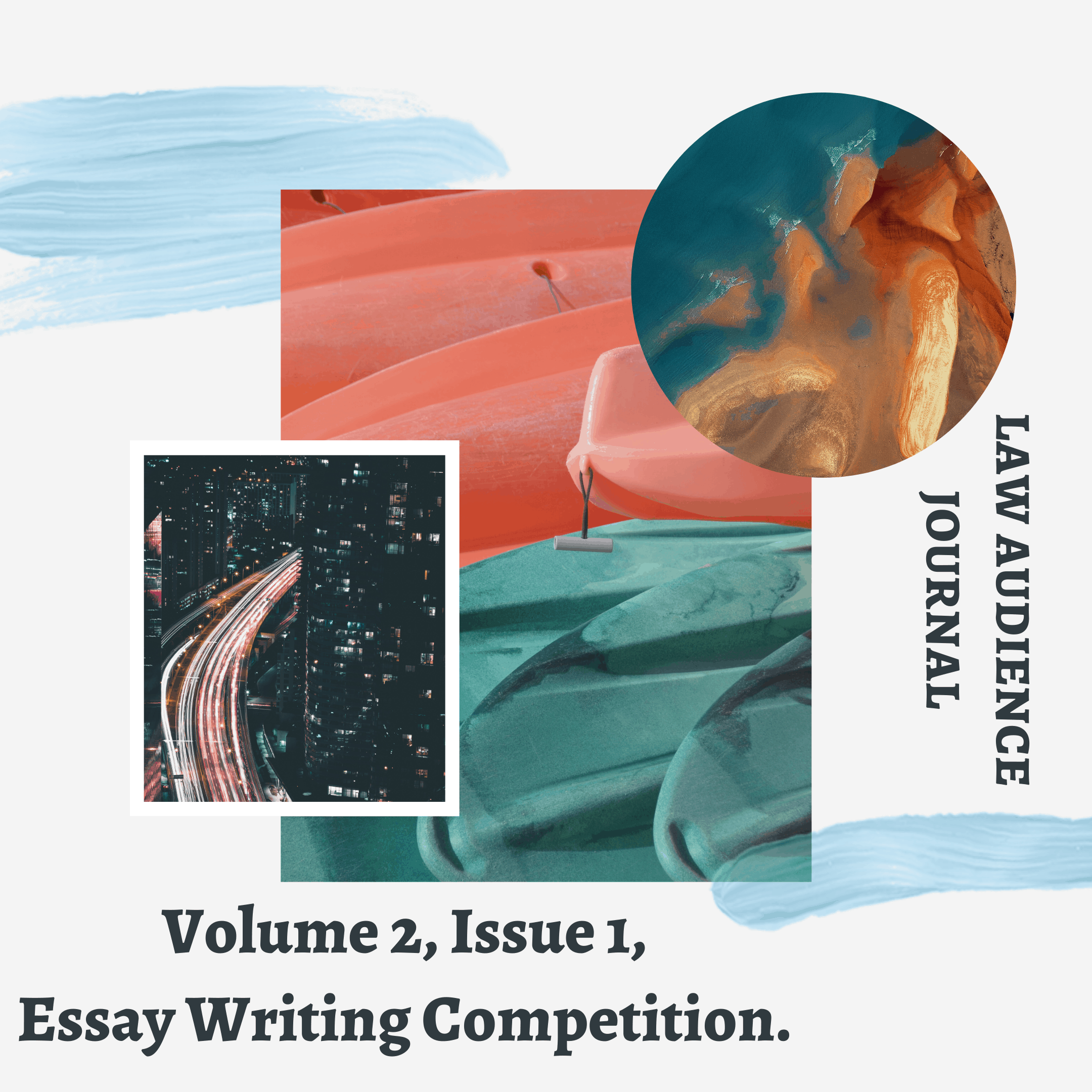AUTHORED BY: MS. ISHITA MISHRA (BBA. LL.B), CO-AUTHORED BY: MS. SHAMBHAVI PRIYA (B.A.LL.B), Banasthali Vidyapith, Jaipur.
I. ABSTRACT:
“As we know that Indian Constitution is the lengthiest and the most detailed of all the written Constitutions in the world. It contains a long list of fundamental rights and duties for its citizens and all the rights and duties are co-related to each other. Constitution of India provides 11 duties as our fundamental duties which are included in part 4 of the Indian Constitution, and those duties should be undertaken by everyone. Fundamental duties are important in term for the well-being of the nation and for the citizens. The fundamental duties are included in part 4 like Directive Principles of the State Policy which says that this is unenforceable by law and, we cannot simply file a case for their violation or non-fulfillment but that should not stop us from performing it because those duties are for the benefits of civilians and it lays down the basics principal for law or regulation for the country.
As Indian work through the concept of dharma so we see these fundamental duties as a basic value which should be cherished by us. We should perform our duties out of respect and not because of penalty or punishments. Fundamental duties help us in balancing our rights and making us more beneficial for the development of the nation and it should act as a source of patriotism and unity among the nation. As the father of the nation quoted “if we all discharge our duties, rights will not be far to seek. If living duties unperformed we run after rights, they will escape us like a will-o’-the wisp.” So, in our essay, we have explained what is our fundamental duties and the sources from which it has been taken and how it act as a means for the citizenry. Further by the end, we have discussed that there are some of the duties which should also be made as a part of fundamental duties, duties such as the duty to vote, duty to raise voice against injustice, duty to help accident victims and generally these things are not even followed by the people in our country.”
II. INTRODUCTION:
Duty- duty is something which bound individual to perform certain things. Its one’s devoir or notion to perform some actions if any or general chances arise. It should not be forced but rather being done by one’s moral obligation.
III. FUNDAMENTAL DUTIES:
The Constitution “42nd” Amendment Act[1], breaches new ground by recommending the pioneering notion of fundamental duties of the Indian citizen is the Constitution. For this purpose, a new part 4A consisting of Art.51A has been added to the constitution. When we talk about rights we must also think of our duties, as a constitutional democracy. The Sate provides rights and lays down duties for the citizenry, so that it makes the society co-exist peacefully. Rights and duties go hand in hand as it was observed: “real rights are as a result of the performance of duty.” “For every right, there is a corresponding duty and thus a civilian has both right and a duty.”
It was stated one man’s right is also his duty, for example, if we have a right to life given by our State; it also imposes an obligation to a person not to expose his life to danger and also respect the life of the others. Many jurists also defined duty in the following manner, a duty is an act which should be enforced by the state in preserving the rights given to the people and also in order to protect the interest of the people.[2]
“A duty is an act which every citizen has obliged to perform in furtherance of protecting the rights of the other people.[3]”
Art. 51 A[4] states the following fundamental duties:
- To uphold the provision of the constitution and honor the national flag and national anthem;
- To follow the patrician ideas of the freedom fighters;
- To armor the sovereignty and integrity of India;
- To contend the nation and devote to the national service whenever needed;
- To advocate and keep the kinship of brotherhood among the people of the nation and to assure the prestige of women;
- To perpetuate the national heritage of the nation;
- To assure our natural resources including forest, lake, river and wildlife;
- To develop the scientific temper, humanism and the spirit of inquiry and reform;
- To look after the property of the public and to dodge peaceableness;
- j. To subsidize to the progress of the nation in all spheres;
- To grant the freedom of education to his child who is between the age of 6 to 14 years;
III.I CASES:
- In this case, it was observed that the petitioner a headliner in the legal attorneys, it was claimed that the petition before the court opposing that neither the people nor the government was giving the sufficient recognition to stop Ganga river from being polluted and it’s mandatory for the people and the government to take stride for the motive of taking care of Ganga river from contaminating and keep it scrubbed. Purpose of protecting the river Ganga from pollution and keep it clean.
- The Supreme Court had held that under article 51A (g) 3, that central government has obligation to initiate mandatory illuminating of the lesson at the minimum of an hour in a while on securing and recovering of the innate habitat in all the educational institution of the nation. The order to the pivotal govt. to make available books drafted on the apt and guidance was given to dispense them free of cost. To convince citizen and make arouse interest among them and for energetic participation, the advice was made for organizing an event such as keeping municipality clean, keep the place clean, and keep the suburb clean week in every city, town, and village through whole India at least yearlong.[5]
- In this case, it was observed A.I.M.S had a central policy of hesitancy to its central students in the postgraduate plan over and above 50%of hesitancy by the central government. The hesitancy infringes article 14 of Indian Constitution and hence the Court stuck the hesitancy and the Court set out the significance of Fundamental duties observe that although Fundamental duties cannot be imposed these are considered significant as they administer worthwhile guidance and are a significant tool for the apprehension of many Constitutional and other legal issues. People’s mandate doubt about the fundamental duties, the article 51A plays a crucial role not only for figuring out the issues but also for making new and trendsetting ideas as assistance given by the Court. All the obligation contain an aspect of duty is built by each obligation and be in their Constitutional limits and respect the Constitutional values.[6]
- In this case, it was observed that The Constitutional legality of the national modules Framework for school Education has been denounced in the Supreme Court that if infringe “Article 28” of the Constitution and its adjacent the materialistic fabric of our Country. The school education was providing value education development related to major religious in the world. The Court held that national curriculum not transmitting any religious guidelines which are prohibited under article 28 these are satisfying the motive what is engraved to advocate goodwill and the spirit of the prevailing guild should be maintained among all the people of the nation in spite of caste, creed, culture, and language and it has to work on relinquishing the several traditions that are demeaning the decency of a woman. [7]
- In this case, there were three children namely Bijoe, Binu, and Bindu were pursuing in Ettumanoor near Kottayam, and when they refuse to chant national anthem of India they were removed from the school because it was not their custom to croon national anthem or hail the national flag of India. The representative filled the case in Kerala high court, trying to restrain the authority from forbidding their school attendance. Appellant challenged that suspension was the violation of their basic rights to freedom of expression under “art 19” and freedom of religion under “art 25” of the Indian Constitution; later on, the case was ousted by the High Court of Kerala on the grounds that no words in the national anthem can provoke any religious belief.
Later on, they filled the case in the Apex Court of India, and it was held that no provision of law in the country specifically bind the citizens to chant the national anthem and that the available measure by Kerala board of schooling misses the judicial force and that was “mere administrative instruction.[8]”
- The following remarks were shaped by the Apex Court of India, previously to the inclusion of the Article“51-A”,
“It is wrong to consider that our constitution only provides rights and no duties. The provision on 4th part permits the legislation to create a well-being community and that the ideas should carry out through the provision of the directive principles of the state policy.”
The Apex Court has referred to these obligations in the connection of the clause (g)—deterioration matters and clause (j)—supremacy in the domestic cases.[9]
III.II SOURCES OF FUNDAMENTAL DUTIES:
Fundamental duties were added by the “42nd Amendment Act” in the year 1976 to our Constitution of India which was suggested by the Swaran Committee and through 86th Amendment fundamental duties were increased to 11 in numbers as earlier it was only 10 in number during 2002. By the 86th Amendment, it was made necessary for the parents and guardians to grant free education opportunity to their children who are above the age of 6 and below the age of 14 years. From Japan and USSR, we implement the ideas of fundamental duties and with the addition of fundamental duties, we all our constitution with the article 29 of the united declaration of human right, and with the provision of many other developed countries.
42nd amendment – during the time of emergency the 42nd amendment came into existence by the former head of the cabinet Mrs. Indira Gandhi it was called as the mini Constitution or the Constitution of Indira because several changes were brought to the Constitution of India and the 11 fundamental duties were also added by it. Mainly the changes were brought on the 3rd January while the other provision, came into existence from 1st April 1977. 86th amendment- only a few countries provide the guidelines stating the duties of the citizen. The countries like Canada and Britain lay importance on the common law and its judicial decision for governing the duties of the citizen.
III.III DUTIES AS A MEANS TO RESPONSIBLE CITIZENRY:
Rights and duties correlative of each other’s, the fundamental duties act a constant remembrance for the civilian about their obligation towards the nation as we know that our Constitution has provided the fundamental rights but that does not mean we don’t have an obligation to fulfill our duties towards the same. Fundamental duties bestow in the Constitution of India makes sure that while the civilian are benefited by their rights they should not forget about their fundamental duties towards the advancement of their own Country, fundamental duties make sure that civilian is not involved in any kind of anti-social activities it provides an active contribution of the people in the society rather than being a spectator in the same.
Fundamental duties advocate a sense of togetherness, discipline and guarantee toward the nation. Fundamental duties are the origin of determining the Constitutionality of the law. Punishment and Penalty will be charged if there is any infringement of rights and duties which are stated in the constitution of India and no one is above the law of the country and no one can violate it. In today world there are lots of people who did not know and are aware of their duties as the citizen. As a liable citizen there is an obligation upon us to make sure that we protect public property, do not trespass on the others land, cause any nuisance in the public or even in the private areas.
In order to create a responsible a citizen for the Country, we must in all means perform our rights as well as duties as both are the side of the same coin, it does not only help citizen but also help the legislature or the executive body of the government. And in order to make it compulsory for all to perform it, we must need a strict legal sanction or it should be made enforceable by the law.
So we should try to fulfill our duties as a means of the legal or even a moral obligation and people should understand that all the time they cannot be reminded to do their rights or duties towards the well-being of the nation, people should feel pride in performing their duties and in order to become a responsible citizen it is necessary for every one of us to follow it wholeheartedly.
We can add more of the duties as a part of fundamental duties like as:
- Duty to cast vote:
Voting is treated as our communal obligation determining our subsequent and thus the civilian has to play a factor in building it. Voting contributes the citizen with an event to aid the community through their engagement in the democratic process. However, looking at the voter turnout during the last general election in 2019 it can be seen that the votes pooled amounted only to about 67.11% of the total voter population. Every citizen should be encouraged to cast their vote in the ongoing election as their legal obligation towards the country.
- Duty of help accident victims:
According to the data every hour 15 person dies in a traffic accident in India. At least 50% of disaster can be stopped if a road accident victim gets proper medical attention on time. Not many people want to help the accident victim because of so many police enquiry and investigation. The misconception should be cleared out among the civilian in order to encourage people to help the victim.
- Duty to prevent civil wrong:
It’s not possible by the State or Government to regulate each and every human conduct at public life, any violence of law or annoyance to communal order is prejudice done to the society, so it’s our obligation to see that fellow civilian do not get involved in any type of civil wrong. The well-educated citizen of the country has the duty to prevent such civil wrongs in their surroundings.
- Duty to raise voice injustice:
If a person watches any injustice around him thus he is in a position to initiate and motivate action against such injustice and in fact, he has a duty to do so. However, now a day’s people have stopped reacting to heinousness crime and they never address crime nor bespeak in a court. This can be attributed to various reasons such as the fear of getting stigmatized, the fear of danger to life or to avoid suffering inconvenience.
IV. CONCLUSION:
In order to conclude, we can say that our right and duties go hand in hand if we are not satisfied by the system or their inadequate working system we cannot just complain of it, we have our own duties to perform and makes sure that things work well. Change is something which is not constant. We cannot change a system, nation, or working institution overnight, we need a lot of time in amending things and making sure that system or things work properly.
As we know that fundamental duties are like the directive principles of state policy which means they are unenforceable by law and there is also some of the shortcomings like their unenforcibilatiy, and the way it’s written is not understood by many people of this country, they take their duties for granted and even these are criticized for being ambiguous and repetitive but that doesn’t mean we will not follow our duties because if we have the rights than it is obvious that we owe a duty towards it. The word fundamental in fundamental duties itself is of great importance and that is why it’s necessary to be followed by each and every one. There are many duties outside the fundamental duties which are also of great importance and are required to be done by everyone.
It’s not always the govt. who will work for us we the citizen also had to work and we have to fulfill our obligation towards the nation and govt. has to make sure that those who don’t fulfill their duties will be punished accordingly.
So, at last, duties create a sense of responsibility on the people for their country and whenever fundamental rights are interpreted fundamental duties are taken into account.
[1] 42nd amendment to constitution of India, officially known as The constitution act, 1976 was enacted during the emergency by the INC government headed by Indira Gandhi.
[2] Keaton.
[3]Salmond.
[4]Article 51A talks about the fundamental and obligatory duties of the citizen.
[5] MC Mehta v. union of India& ors, 1988.
[6] AIMS students union v. AIMS & ors, 2001.
[7] Aruna Roy v. union of India 2002.
[8] Bijoe Emmanuel v.State of Kerala, 1986.
[9] Chandra Bhavan Boarding v. The State of Mysore, 1969.


